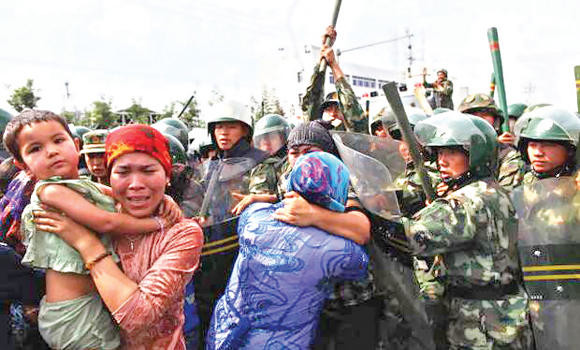BEIJING: China has banned civil servants, students and teachers in its mainly Muslim Xinjiang region from fasting during Ramadan and ordered restaurants to stay open, official websites showed as the holy month began on Thursday.
Shops and restaurants owned by Muslins have also been ordered to continue selling cigarettes and alcohol over the course of the month – or be shut down altogether.
The Uighur leader, Dilxat Raxit, sees the move as China’s attempt to control their Islamic faith and warned that the restrictions would force the Uighur people to resist the rule of the Chinese government even more.
He added: “The faith of the Uighurs has been highly politicized and the increase in controls could cause sharp resistance.”
"Food service workplaces will operate normal hours during Ramadan," said a notice posted last week on the website of the state Food and Drug Administration in Xinjiang's Jinghe county.
Officials in the region's Bole county were told: "During Ramadan do not engage in fasting, vigils or other religious activities," according to a local government website report of a meeting this week.
"China's goal in prohibiting fasting is to forcibly move Uighurs away from their Muslim culture during Ramadan," said Rexit, spokesman for the exiled World Uighur Congress.
"Policies that prohibit religious fasting are a provocation and will only lead to instability and conflict."
Going one step beyond simply discouraging government employees to forgo fasting, police and court officials in Awat county were ordered to "take the lead in teaching family members not to fast and not to participate in Ramadan-related religious activities", according to a post on China Legal Media.
As in previous years, school children were included in directives limiting Ramadan fasting and other religious observances.
The education bureau of Tarbaghatay city, known as Tacheng in Chinese, this month ordered schools to communicate to students that "during Ramadan, ethnic minority students do not fast, do not enter mosques... and do not attend religious activities".
Similar orders were posted on the websites of other Xinjiang education bureaus and schools.
Ahead of the holy month, one village in Yili, near the border with Kazakhstan, said mosques must check the identification cards of anyone who comes to pray during Ramadan, according to a notice on the government's website.
China bans Ramadan fasting, say Uighurs
China bans Ramadan fasting, say Uighurs










